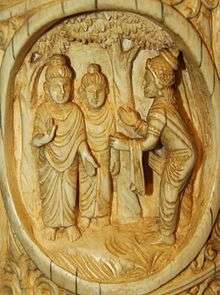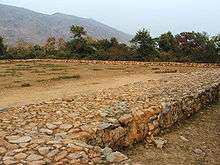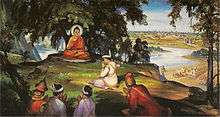Bimbisara
| Bimbisara | |
|---|---|
 Bimbisara welcomes the Buddha | |
| Founder of Haryanka dynasty | |
| Reign | c. 544 – c. 492 BCE (52 years) |
| Predecessor | Bhattiya |
| Successor | Ajatashatru |
| Born | c. 558 BCE |
| Died | c. 491 BCE |
| Spouse |
Kosala Devi Chellana Khema |
| Issue | Ajatashatru, Abhay |
| Dynasty | Haryanka |
| Father | Bhattiya |
| Religion | Buddhism, Jainism |
Bimbisara (c. 558 – c. 491 BC)[1][2] or Srenika was a King of Magadha (r. 542 – 492 BC)[3] and belonged to the Haryanka dynasty.[4] He was the son of Bhattiya.[5] His expansion of the kingdom, especially his annexation of the kingdom of Anga to the east, is considered to have laid the foundations for the later expansion of the Maurya Empire.[6]
He is also known for his cultural achievements and was a great friend and protector of the Buddha. Bimbisara built the city of Rajgir, famous in Buddhist writings. He was succeeded on the throne by his son Ajatashatru.[6]
Biography
Bimbisara's laid the foundations of Magadha by fortification of a village, which later became the city of Pataliputra.[7] His first capital was at Girivraja (identified with Rajgir or Rajagriha). He led a military campaign against Anga, perhaps to avenge his father's earlier defeat at the hands of its king, Brahmadatta. The campaign was successful, Anga was annexed, and prince Kunika (Ajatashatru) was appointed governor at Champa.[8]
Marriage alliances
Bimbisara used marriage alliances to strengthen his position. His first wife was Kosala Devi, the daughter of Mahā Kosala the king of Kosala, and a sister of Prasenjit. His bride brought him Kashi, which was then a mere village, as dowry.[9] This marriage also ended the hostility between Magadha and Kosala and gave him a free hand in dealing with the other states. His second wife, Chellana, was a Lichchhavi princess from Vaishali and daughter of King Chetaka.[10] As per Indologist Hermann Jacobi, Vardhaman Mahavira's mother Trishala was daughter of Chetaka. His third wife, Kshema, was a daughter of the chief of the Madra clan of Punjab.[11] These marriage alliances paved the way for the expansion of Magadha Empire both westward and northward.
Although Bimbisara let the women in his palace visit Buddha in his monastery in the evenings; the women wanted a hair and nail stupa they could use to venerate the Buddha any time. After Bimbisara spoke with Buddha who complied with their request.[12]
Death

According to the tradition, Bimbisara was imprisoned by his son Ajatashatru to ascend the throne of the kingdom of Magadha. Ajatashatru later ordered his father's release after the birth of his first child, but by then it was too late and Bimbisara had already died. This was reported to have taken place around 491 BC.[4]
Buddhist tradition

According to Buddhist scriptures, King Bimbisara met the Buddha for the first time prior to the Buddha's enlightenment, and later became a disciple that featured in certain Buddhist suttas.
Jain tradition
Bimbisara is referred to as Shrenika[13][14][15] of Rajgir in Jain literature who became a devotee of Jainism impressed by the calmness of Yamadhar (a Jain Muni).[16] He frequently visited Samavasarana of Lord Mahavira seeking answers to his queries. He asked about the true version of Ramayana[17] and an illuminating sage (King Prasana).[18]
Bimbisara sent Jivaka to Ujjain for medical treatment of Pradyota, the king of Avanti.
He was allegedly Baldev in a previous life.[19]
Per scriptures, Bimbisara killed himself in a fit of passion, consequently, reborn in hell, where he is currently residing, until the karma which led to his birth as hell-being comes to an end.[20] It is further written, that he will be reborn as Mahapadma (sometimes called Padmanabha), the first in the chain of future tirthankaras who are to rise at the beginning of the upward motion (Utsarpini) of the next era of time.[21]
See also
Notes
- ↑ Rawlinson, Hugh George. (1950) A Concise History of the Indian People, Oxford University Press. p. 46.
- ↑ Muller, F. Max. (2001) The Dhammapada And Sutta-nipata, Routledge (UK). p. xlvii. ISBN 0-7007-1548-7.
- ↑ Indian History -APC - APC Publishers, India
- 1 2 Stearns, Peter N. (2001) The Encyclopedia of World History, Houghton Mifflin. pp. 76-78. ISBN 0-395-65237-5.
- ↑ Raychaudhuri 1923, p. 97.
- 1 2 "Bimbisara". Encyclopædia Britannica Online. Retrieved 25 January 2013.
- ↑ Sastri 1988, p. 11.
- ↑ Upinder Singh 2016, p. 269.
- ↑ Eck, Diana. (1998) Banaras, Columbia University Press. p. 45. ISBN 0-231-11447-8.
- ↑ Luniya, Bhanwarlal Nathuram. (1967) Evolution of Indian Culture, Lakshmi Narain Agarwal. p. 114.
- ↑ Krishna, Narendra. (1944) History of India, A. Mukherjee & bros. p. 90.
- ↑ John S. Strong (2007), Relics of the Buddha, p. 72
- ↑ Dundas 2002, p. 36.
- ↑ von Glasenapp 1999, p. 40-41.
- ↑ Jain & Upadhye 2000, p. 59.
- ↑ Queen Chelna and King Shrenik
- ↑ Dalal, Roshen (2010), Hinduism: An Alphabetical Guide, India: Penguin Books, p. 338
- ↑ Leshyas
- ↑ Choksi, Mansi; Chhapia, Hemali (10 February 2011), Now, meet Ravan the saint, The Times of India
- ↑ Dundas 2002, p. 41.
- ↑ Dundas 2002, p. 40-41.
References
- Dundas, Paul (2002) [1992], The Jains (Second ed.), Routledge, ISBN 0-415-26605-X
- Jain, Hiralal; Upadhye, Dr. Adinath Neminath (2000), Mahavira his Times and his Philosophy of Life, Bharatiya Jnanpith
- Raychaudhuri, Hemchandra (1923), Political History of Ancient India, University of Calcutta
- Sastri, Kallidaikurichi Aiyah Nilakanta, ed. (1988) [1967], Age of the Nandas and Mauryas (Second ed.), Delhi: Motilal Banarsidass, ISBN 81-208-0465-1
- Singh, G. P., Early Indian Historical Tradition and Archaeology, p. 164
- Singh, Upinder (2016), A History of Ancient and Early Medieval India: From the Stone Age to the 12th Century, Pearson Education, ISBN 978-93-325-6996-6
- von Glasenapp, Helmuth (1999), Jainism: An Indian Religion of Salvation [Der Jainismus: Eine Indische Erlosungsreligion], Shridhar B. Shrotri (trans.), Delhi: Motilal Banarsidass, ISBN 81-208-1376-6
| Regnal titles | ||
|---|---|---|
| Preceded by Bhattiya |
Emperor of Magadha 543–491 BCE |
Succeeded by Ajatashatru |